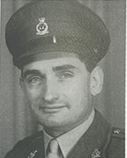Tony Harrison was an outstanding all-around sportsman, in every sense of the word.

Although accomplished at all sports and games, he was at his most brilliant on the rugby pitch, where he played to international standard. As fly-half, he was intelligent and quick-thinking: fit, fast, fearless and aggressive.
Although a quiet and unassuming officer, these were the qualities, which he brought to soldiering: so it is no surprise that he earned two Mentions in Dispatches on active service.
He was a very popular and efficient officer, both at Regimental duty and on the staff: but above all, he was a remarkable husband and father, who succeeded in juggling his family and military duties to the satisfaction of both parties.
He joined 4H from the Inns-of-Court Regiment towards the end of the Second World War and, from 1948 to the end of 1951, went with the Regiment to Malaya; to fight in the ten-year so-called Emergency.
This was a long drawn-out campaign against the Communist Malayan People’s Liberation Army, which had fought with distinction against the hostilities.
In the conclusion of the governance of Malaya, they reformed and turned against the terrorist campaign by gangs of ‘bandits’: but in the early period the British.
In later years, the Emergency developed into a hit-and-run MPLA that was formed into uniformed military units which actively sought to disrupt communications and destroy rubber estates, tin mines and other aspects of the economy of the country. Tony received his second “Mention” during operations in Malaya.
He returned to Tidworth with 4H in December 1951, and later served in BAOR with the Regiment and on the staff of the 7th Armoured Division until 1955, when he went out to Tripoli as GS02 of the 10th Armoured Division – returning to the Regiment in 1957.
During the subsequent run-up to amalgamation with 8H, he commanded a sabre-squadron of 4H before a final stint in the War Office, prior to relinquishing his commission. During these years, (wherever
serving), he and his wife ‘Biddy’ were a great asset to family life on-station. They took a full part in social activity and were very hospitable. No doubles partnership ever trounced so many at tennis with such grace and magnanimity!
Initially, on leaving the Army, he became a Queen’s Messenger, but found this too disruptive of family life and immensely boring, with the constant shuttling around the sky from airport to airport. He then joined the Shell-Mex Company as an executive but liked neither working in a London office nor the constant drive for increased profitability.
He decided that his metier was to train boys to be good citizens and took a post in a boys preparatory school at Burnham-on-Sea, teaching English, French and sports: later moving to Bagshot in Surrey. He duly extended his scope to become housemaster and deputy headmaster, with Biddy a tower of strength as a splendid “house mother.”
Fortunate indeed were the boys who thrived in their care! On final retirement, they moved to Helston in Cornwall where Biddy’s family were settled. By this time, their elder daughter, Sally, had emigrated to Australia with her husband and children: but their other daughter, Joanna, lived not far away. They and Sally’s family exchanged several visits over the years and, due course, Joanna’s daughter Rebecca moved to Helston in order to live with her grandparents.
This was a great blessing for them and everything was progressing very favourably. Country pursuits, sailing and riding were all conducive to happiness: and they were avid caravanners all over Europe and the UK. Then, in 2002, Tony was suddenly struck down with cancer. Naturally, he accepted this blow stoically and with the minimum of fuss: and did not wish his fate to be broadcast.
He died as he had lived – without fanfares or untoward bother, surrounded by his nearest and dearest, and facing the inevitable with calmness and courage.
Throughout his life, in the best tradition of the 4th Hussars, he consciously strove to obey the first Regimental Standing Order that he should: “Always do his duty to the utmost of his ability, whether present with or absent from the Regiment”. Surely, there can be no better epitaphs!


